GreenSpace: Graduating from disposal to recycled clothes
This spring, thousands of college students across the nation will aim to be below average. To that end, they'll go through their dorm-room closets, dressers, gym bags, and more, seeking to weed out all the clothes they don't need anymore, won't wear again, or simply can't fit into the luggage they're taking home.

This spring, thousands of college students across the nation will aim to be below average.
To that end, they'll go through their dorm-room closets, dressers, gym bags, and more, seeking to weed out all the clothes they don't need anymore, won't wear again, or simply can't fit into the luggage they're taking home.
I say "below average" because, apparently, the average person tosses a lot.
According to the latest municipal solid waste report by the U.S. Environmental Protection Agency, about 13 million tons of textiles - a grab-bag group that includes more than clothing, but it's the closest the report gets - entered the municipal waste stream in 2010.
Of that, only about 15 percent was recycled.
Which means the equivalent of roughly 70 pounds of textiles per American wound up in landfills.
Students probably used to be above-average offenders, too. But increasingly, institutions of higher learning have programs to keep it out of landfills and use it to raise money to benefit the local community.
From the University of Pennsylvania to Drexel University to Ursinus College and beyond, officials and students are setting up collections and, in some cases, sales with proceeds benefiting charity.
Nationally, SustainU, a West Virginia-based company that makes clothing with leftover cotton and fibers from recycled plastic bottles, has instituted a One Shirt Challenge to get students to hand over their clothes instead of tossing them.
Company spokesman Trey Dunham said they wanted to raise the profile of textile recycling.
The challenge probably has the catchiest slogans, too - "Stripping Down for Mother Earth," and "Now's Your Chance to be Below Average."
This is the program's third year. After collecting 30,000 pounds the first year and 60,000 the second, SustainU decided to partner with Planet Aid, a national nonprofit that has an infrastructure of yellow bins and trucks.
Planet Aid also has pledged to donate money to a charity of each school's choice - up to five cents a pound - a level reached after 600 pounds of clothing are collected, said spokeswoman Kelly Jamieson.
Planet Aid takes items to a central location - Philadelphia, in this region - where it bales the clothes and sells them to a wholesaler, donating some of the proceeds to charity.
Most of the clothing winds up halfway around the world, helping out there, but at the cost of considerable transportation-related carbon emissions.
Planet Aid wooed a few local schools this year, but many already have great programs up and running, with significant local impact.
In 2008, officials at the University of Pennsylvania launched PennMOVES, which stands for Move Out Volunteers Engaging in Service.
The group collects items students won't be taking with them, from books to furniture to appliances, but mostly clothing. On average, 90,000 pounds of items are collected each year.
"We collected more than we ever imagined," said spokeswoman Barbara Lea-Kruger. "It's amazing amounts of clothing."Everything from T-shirts to designer clothes, sneakers to high heels. Students who live in warm climates leave their winter clothes."
The event has evolved. At first, items were collected and distributed to local nonprofits.
Then, Penn joined with United Way and held a community sale, raising more than $45,000, which went to charities in local neighborhoods.
And it keeps growing in size and impact.
In 2011 and 2012, Penn collaborated with Goodwill Industries.
Sale of all the stuff collected those two years produced more than $70,000, which benefited Goodwill's local job training programs for people with disabilities and other barriers to employment. Goodwill's newest initiative is with a city program for reintegrating ex-offenders.
This year, Penn is continuing the collection, but not the sale. Items will go directly to Goodwill, which later this year plans to open a store to serve the West Philadelphia community.
So, residents there will be getting Ivy League threads.
Not too shabby.
And a great lesson for anyone in how trash is often just treasure in disguise.
GreenSpace: Where to Donate Clothes
Not everything needs to be wearable. Many items can be used for rags or insulation.
Goodwill Industries: www.goodwill.org
Has many stores here. Proceeds go for job training.
Salvation Army: www.salvationarmy.org
Also has stores and many social programs.
Dress For Success: www.dressforsuccess.org
Work attire for job-ready women. 215-351-1150.
One Warm Coat: www.onewarmcoat.org
Redistributes coats. See its website for partners.
REUSE-a-SHOE: www.nikereuseashoe.com
Rittenhouse Sports Specialties (1717 Chestnut St., 215-569-9957) collects shoes. Wearable ones are donated. Unwearables go to Nike's REUSE-a-SHOE program, to be reused for athletic surfaces.EndText